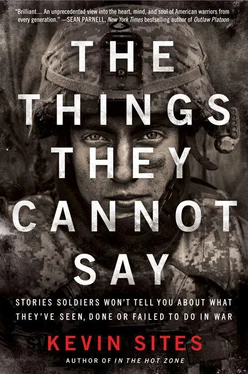The men dug protective trenches around their vehicles and slept, exhausted, for much of the next day and night as jets and artillery began softening up the city for the ground assault to come.
When the order finally came to move, Sperry was surprised at how empty the city was. It seemed to him like a ghost town. At first, as the Marines entered, they found no insurgents but fully loaded weapons staged behind walls and other tactical locations. Sperry picked up an AK-47 lying on the ground, stripped off its banana clip and ejected the 7.62 round already in the chamber before dropping it back down. “Dumbass,” someone yelled at him, “that coulda been booby-trapped.”
While the Marines of Sperry’s 3rd Platoon still couldn’t see them, the insurgents let them know they hadn’t completely left town. Lance Corporal Jody Perrite got hit with a sniper round in his right arm, which entered right below his Marine bulldog tattoo and exited on the other side. Other Marines started getting picked off too. The insurgents were prepared and knew the terrain. They used low-tech improvisational tactics to safeguard their firing positions, like scattering shards of broken lightbulbs on the concrete stairways leading to the rooftops where they were hiding. That way when the Marines moved in they’d hear them coming. The confusion and uncertainty of combat also gave way to comic moments. As Sperry and his squad moved up the stairway of one house, the squad lined up outside a closed door made from corrugated aluminum. Believing there were insurgents on the rooftop, the Marine in front, carrying a shotgun, wound up and stomp-kicked the door, center-mass. Instead of caving in, it reverberated like a cymbal back on the kicker in a loud twang. The Marines laughed, knowing that any element of surprise was just lost with their clumsy entrance. The rooftop was clear, but the Marines started taking fire from the roof of another location. They ducked behind the parapet. A Marine in the squad put his Kevlar helmet on the muzzle of his M16 and poked it high enough to draw fire from the snipers. When they saw where the shots were coming from, the fireteam leader fired a 40 mm grenade from the M203 grenade launcher slung under his rifle. After the explosion, the rooftop went silent. But the calm didn’t last very long. The snipers were just the trigger for an insurgent trap in the normally busy market area known as Jolan Park. Once the Marines entered the maze of narrow alleyways, they got boxed in by sniper fire in front of them and RPG rounds to the rear. And now that they had the Marines where they wanted them, insurgents began hanging mortar rounds right on top of them. The illusion of an abandoned Fallujah had just gone to shit. The trapped Marines called up the heavy guns.
Abrams M1A1 tanks rumbled down the wider passageways, rotating their turrets to the left or the right like iron elephants deciding whether to charge. Once the turret swiveled in the direction of a target, a car parked in an alleyway or even a suspicious container, it wasn’t long before the tank’s main gun punched a high-explosive round into it, turning the target into a ball of flame.
Sperry was told by his team leader to move up the street and get in front and to the right of one of the tanks to provide security. “Fuck no,” he remembers telling him. There wasn’t any cover up there. But Sperry said he soon relented and within moments of taking his position, he found himself swirling down the rabbit hole that would change his life forever.
“The next thing I know I’m smelling gunpowder. I didn’t hear anything but remember the sensation of me being thrown on my back,” says Sperry. “Then I black out and when I wake up, Doc Jacoby is working on me. ‘Holy shit, look at his Kevlar,’ I remember somebody saying. Then Sergeant Love said to me, ‘Hold on, Sperry, for your wife. You’re going to be okay.’ Then I looked up and remember seeing you taking pictures of me and then I blacked out again.”
Sitting in his home, seated around this table with him and his wife, I’m fascinated, finally hearing the details I never knew from our encounter so many years ago in Fallujah. For me, Sperry was the first American casualty I saw during the fight for Fallujah. I remember following a group of Marines carrying him into the cover of an alleyway after he was wounded, Hannon’s rosary dangling from his belt loop. Several men propped him up while the Navy corpsman bandaged his head. “I remember being stretchered out,” he says. “I wake up again, on the chopper, puking blood straight up, and it was falling down on my face. I turn to my left and there are body bags in the middle of the Chinook. [14] The CH-47 Chinook is an American heavy-lift, double-rotor transport helicopter. It has been in continual use by the U.S. military since the Vietnam War.
The doc [a medic] wipes blood off my eyes. Then I don’t remember anything until being at Balad in a tent and some guys were checking me out. [15] Balad, seventy miles north of Baghdad, was a hub site of air operations both under former dictator Saddam Hussein and for coalition forces following the U.S.-led invasion of Iraq. Under the U.S. military occupation it became known as Joint Base Balad.
A female nurse, a brunette, asks me how I’m doing. My head hurts. I’m taken for scan. I black out again. The most I can remember from Balad is that brunette nurse taking care of me.”
After his flight to Germany, Sperry woke up in a hospital room filled with three wounded officers all on life support. When a nurse came in and called him Captain Sperry, even given his head injuries he still realized there had been a mix-up in admissions. It didn’t take long for him to be moved to the enlisted ranks area of the hospital. But the confusion didn’t end there. Sperry had been reported KIA, or killed in action, by someone from his battalion. Fortunately for his family, that information never reached them. Sperry was able to call his father and stepmother from the hospital. They weren’t at home at the time, but he was able to leave a voice mail letting them know he had been injured but was still alive and in Germany. Cathy, however, was still at Camp Lejeune, in generator-repair school, and learned of his injury from my report before anyone officially notified her. The combat images I transmitted from my laptop and satellite modem from the battlefield were grainy and dark, but Cathy says she knew with one look and without any doubt that the wounded Marine whose head was being bandaged in front of my camera was her husband, James.
What injured Sperry is still a mystery even now. Fellow Marines suspected it was a bullet ricochet, while his doctors in Germany believe it may have been a tiny fragment of a rocket-propelled grenade that sliced through his Kevlar helmet and into his brain. Whatever it was, it took out a sliver of his frontal lobe, the part of the brain that controls emotions and is also said to be the place where our personality resides. Sperry had a litany of injuries in addition to the mystery trauma to his brain. This includes fractures at the base of his skull and his nose, as well as a broken sternum and four broken ribs caused by the force of shrapnel or bullet rounds blunted by the ceramic plate inserted at the front of his body armor. Doctors pumped him full of steroids to counter the cranial pressure of his brain bleed and stabilized him enough to fly him back to the U.S. While he waited for the transport, Sperry says, he got bored, rolled his wheelchair across the street to a PX and bought a six-pack of Bud Light. Though still on morphine for his pain, he says he savored one of the beers, his first in months, until an orderly took the rest away.
On the flight from Germany to a hospital in California, Sperry’s jet stopped at Scott Air Force Base in Saint Louis, where his dad and his stepmother were able to see him during a short layover. He had asked them in an earlier telephone call to find out what had happened to other members of his unit, since he’d had little to no contact with anyone since being flown out of Fallujah. During the Saint Louis layover, his father gave him a sheet of paper. On it was a list of twenty names, all Marines from Sperry’s unit who had not made it out of Fallujah alive. [16] According to U.S. Marine Corps documents, 3/1 Marines had the highest casualty rate of any unit during Operation Phantom Fury, with 22 killed and 206 wounded in action.
Sperry says he dropped the paper and put his face in his hands, wondering how that was even possible.
Читать дальше












